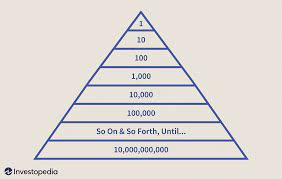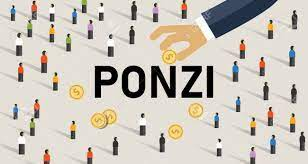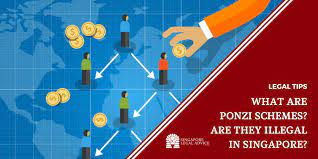
At David T Rosen, we are investors committed to helping investors protect their assets and make informed decisions. That’s why we want to warn you about pyramid schemes and investment scams that can cause you to lose money and damage your financial future.
What is a Pyramid Scheme?
A pyramid scheme is a fraudulent business network marketing model that recruits members to earn commissions by making payments and convincing others to join the project and payout.
The more people you recruit to pay out, the more money you can make. However, the system eventually collapses when there are insufficient recruits or members to pay out to sustain the payouts. As a result, when pyramid schemes collapse, only the early investors make money, while most participants lose money.
How to Spot a Pyramid Scheme?
Pyramid schemes can take many forms, such as:
- Multi-level marketing programs that focus more on recruitment than product sales.
- High-yield investment programs that promise unrealistic returns with little or no risk.
- Work-at-home schemes that require you to pay upfront fees for training, equipment, or materials.
To avoid falling for a pyramid scheme, watch out for these red flags:
- Promises of quick and easy profits without any effort or risk.
- Emphasis on recruiting new members rather than selling a legitimate product or service.
- Pressure to invest now or lose out on a limited opportunity.
- Lack of documentation or transparency about the company’s business practices, financial status, or legal compliance.
- Testimonials or endorsements that seem too good to be true or are from unknown sources.

What Are the Consequences of Participating in a Pyramid Scheme?
If you invest in a pyramid scheme, you risk losing all or most of your money and facing legal or social consequences. Pyramid schemes are illegal in most countries, and participants can be charged with fraud or other criminal offenses.
Moreover, being associated with people involved in a pyramid scheme can damage your reputation, credibility, passive income, and relationships and harm the wider community.
How to Protect Yourself from Pyramid Schemes?
The best way to protect yourself and investor funds from illegal pyramid scheme schemes later investors is to stay informed, skeptical, and cautious of new such pyramid schemes promise and new investors. Here are some tips to follow:
- First, research the company and its leaders before investing money or time.
- Check the company’s registration, licensing, and history with relevant authorities, such as the Securities and Exchange Commission (SEC), the Federal Trade Commission (FTC), or the Better Business Bureau (BBB).
- Ask questions and demand answers about the company’s products, services, sales, compensation, and risks.
- Consult independent and reliable sources of information, such as financial advisors, consumer watchdogs, or online forums.
- Trust your instincts and avoid anything that sounds too good to be accurate or pressures you to act quickly or secretly.
- Report any suspected pyramid scheme or investment fraud to the authorities or the appropriate agencies.

The Anatomy of a Pyramid Scheme
Pyramid schemes typically have a hierarchical structure that resembles a pyramid, with a few people at the top who recruit others, who in turn recruit recruits, more people lose and others, more recruits sell for more compensation, and so on.
The early investors, often the organizers or the insiders, make money by becoming new participants and taking a cut of the revenue generated when other recruits pay earlier investors’ payments or by selling overpriced or worthless products or services to recruits.
The latecomers, who are the majority of the participants, lose money because they cannot recruit enough new members to generate a profit. Eventually, the pyramid collapses, the investors lose everything, and the organizers disappear with the money, leaving behind a trail of victims.
The Risks of Participating in a Pyramid Scheme
Participating in a pyramid scheme is financially risky and morally and legally wrong. Pyramid schemes use deception, wire fraud, coercion, financial fraud, and exploitation to lure people into investing their time, money, and energy.
They promise easy money and fast riches but deliver only disappointment and hardship. Moreover, pyramid schemes are illegal in most countries, including the United States, where they are considered securities fraud.
If you invest a very substantial amount of product or service amount enough money in a pyramid scheme, you may face various consequences, such as:
- You are losing all or most of your investment, including your initial payment and any subsequent fees, charges, or taxes.
- You are being targeted by other scams or frauds, as your personal and financial information may be shared or sold to other criminals.
- Being subject to legal actions, fines, or imprisonment, you may be held accountable for aiding and abetting the pyramid scheme.
- You were damaging your relationships, reputation, and self-esteem, as you may feel embarrassed, ashamed, or betrayed by the people who recruited you or whom you recruited.
- Missing out on legitimate opportunities to invest, learn, and grow, as you may be distracted, disillusioned, or discouraged by the pyramid scheme.
How to Avoid Falling for a Pyramid Scheme
The best way to earn money and protect yourself from a pyramid scheme is to be vigilant, informed, and skeptical. Here are some tips to help you avoid falling for a pyramid scheme:
Please do your research: Before investing money, time, or effort in a scheme, check its background, history, and reputation. Look for reviews, ratings, and feedback from other investors, experts, earlier investors, federal regulators, and authorities.
Next, check if the scheme, product, or service is registered with the SEC or other regulatory agencies. Finally, verify if the plan, product, or service’s claims, financial statements, or projections are reasonable and credible.
Know the warning signs: Be aware of the common symptoms and warning signs of a pyramid scheme, such as:
- A high emphasis on product or service or on recruitment
- A soft focus on genuine product or service quality
- Promises of easy money or guaranteed return on money paid
- Unrealistic or guaranteed returns on the natural product or service used
- Pressure to join or act quickly
- Lack of transparency or documentation of the actual product
- Internet advertising, and testimonials or endorsements from unknown or fake sources. If something sounds too good to be true, it probably is.

Ask questions: Ask the scheme’s organizers or recruiters for more information, clarification, or proof. Ask them about their company website retail sales, products or services, revenue generated from retail sales alone, products or services, costs, risks, and returns.
Ask them about their legal and financial status, complex commission structure demonstrated revenue side, business plan, complex commission structure, recurring fee structure, and exit strategy. If they refuse or evade your questions, that’s a red flag.
Seek advice: Consult with a financial advisor, an attorney, or a consumer watchdog before investing money. They can give you unbiased, expert, and personalized advice on evaluating the scheme underlying product or service’s potential risks and rewards, protecting your assets, and spotting red flags.
Report suspicious activity: If you suspect a scheme is a pyramid scheme or any other type of investment fraud, report it to the SEC, the FTC, or the BBB. You can also report it to your state securities regulator or local law enforcement agency.
By reporting suspicious activity, you can help prevent others from becoming victims of the same investment opportunity, illegal pyramid schemes, or similar schemes.
In conclusion, pyramid schemes are fraudulent and illegal, promising high investment returns to new investors and new participants, but rely on recruitment and deception to get new participants and generate profits from new participants.
They can cause financial, legal, and emotional harm to their participants and should be avoided at all costs. To protect yourself from pyramid schemes and other types of investment fraud, you should be vigilant, informed, and skeptical, seek advice and report suspicious activity.
Remember, if something sounds too good to be true, it probably is.

Conclusion
Pyramid schemes threaten your financial well-being and trust in legitimate investment products or services.
However, you can protect yourself and your loved ones from financial harm and legal trouble by spotting and avoiding pyramid schemes, new investors, and financial fraud.
At David T Rosen, we believe that informed investors are empowered investors, and we are committed to helping you make enough money to achieve your financial goals safely and ethically.
If you have any questions about financial statements or concerns about pyramid schemes or other investment scams, please don’t hesitate to contact us. We are here to help you make smart and responsible financial professional investment decisions.
CoopBusiness is a revolutionary cooperative business-building platform that empowers individuals to become entrepreneurs, business owners, and financially independent.
As a member, you’ll receive top-level business mentorship, access to our proprietary business systems, and the opportunity to access the funds you want to turn your business ideas into reality.